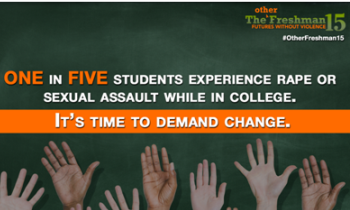Dear College Presidents: What’s Your School Doing to Prevent College Sexual Assault?

In late August, as thousands of students across the country geared up for college, FUTURES launched an awareness-raising campaign called The Other Freshman 15.
The first 15 weeks can be the riskiest time for students—and not just for weight gain as the common expression of “the freshman 15” connotes. School administrators also call the first few months the “Red Zone,” a time when a college student is most vulnerable to sexual assault. But that isn’t to say that assaults stop at Thanksgiving break.
This campaign rallies communities to voice their concern to college presidents about doing more on campuses to address this problem. We developed an interactive website to raise awareness around this important issue, encouraging students, parents, and alumni to send a personal email directly to their college presidents that call for more comprehensive policies, student involvement, effective preventative programming, trained staff, and victim-centered responses.
Our friends and supporters kindly shared some of their responses with us and we are highlighting a few of our favorites here!
From Menah Pratt-Clarke, Associate Chancellor for Strategic Affairs at University of Illinois Urbana-Champaign:
“Illinois has always maintained a culture of care when responding to reported incidents of sexual assault or any other trauma by connecting victims or those affected with campus (e.g., Dean of Students, Counseling Center, Women’s Resources Center) and community resources that can assist with processing and attending to the impact of the trauma.”
We love U of I’s trauma-informed approach and creating that “culture of care.”
From the Cynthia Barnhart, Chancellor of MIT:
“In addition, we developed a sexual assault survey, administered it, and have been analyzing the results over the summer. In the next few weeks, we will be distributing a report to the community summarizing what we learned about the MIT perceptions about and prevalence of sexual assault.”
We applaud MIT’s effort to collect and analyze data (in true MIT fashion) to inform how they will continue to address sexual assault on campus! We hope more colleges will follow suit.
From President Teresa A. Sullivan, University of Virginia:
“Education and training are important first steps. We have launched a new website that provides information for our students and employees about sexual violence and how to report it. Our incoming students participate in learning programs about sexual-violence prevention and bystander intervention as part of their orientation process, and formal, online training for students will begin in November of this year. In the meantime, our Dean of Students has hired a new, full-time professional to focus exclusively on sexual misconduct and hazing education and prevention.”
We agree that education and training are essential. We hope that prevention programming also extends to all students – not just freshman. And kudos for hiring a dedicated staff person for doing this important work.
From President Phil Schubert, Abilene Christian University:
“Even before the issuance of the Department of Education’s (DOE) April 2011 Dear Colleague Letter (“DCL”), ACU took great steps to both meet our obligations under the law and respect the dignity of each of our students…We also are currently evaluating online training modules to provide campus-wide later this year, exploring partnering with other local universities in regard to prevention, following up in the Residence Halls after the mandatory training, and organizing a student-driven board to consider our efforts and find ways to improve. (Some of those students include current graduate students who are trained as advocates by our Regional Crime Victim’s Crisis Center.)”
We appreciate ACU’s student involvement in improving policies and programming, and that ACU is exploring the possibility of partnering with other local universities in their prevention efforts.
To date, more than 900 emails have been sent and 5,000+ posts on Facebook and Twitter have been shared. We have approximately 350 schools represented out of our list of more than 1,000. Help us reach out to more college presidents!
Visit www.otherfreshman15.org and take action now!
If you would like to share your college president’s response with us, please email me at: lkim@futureswithoutviolence.org. We’d love to hear from you!





